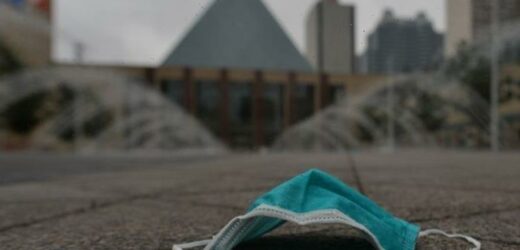TfL chief claims around 85-90% of tube passengers wear masks
We use your sign-up to provide content in ways you’ve consented to and to improve our understanding of you. This may include adverts from us and 3rd parties based on our understanding. You can unsubscribe at any time. More info
The results from the randomised controlled trial, which is the gold standard when it comes to quality, showed that surgical masks are much better than cloth ones. Scientists who led the study are confident their results should end any debate on mask effectiveness as well. Megan Ranney, an emergency medicine physician and a professor at Brown University said: “This was an incredibly challenging but important study to pull off.
“Anti-mask people keep saying, ‘Where’s the randomized controlled trial?’ Well, here you go.”
In this study, researchers from Bangladesh and the US tested the effectiveness of masks across 600 villages in Bangladesh.
It involved more than 342,000 adults, making it the largest-ever randomised trial to be conducted on mask usage.
Observational studies, which only compare mask-wearing behaviours to infection rates in different areas, can be confused by a lot of other factors.


But randomized controlled trials, where people are randomly assigned to either receive a medical intervention or not, are viewed as the most solid way of providing evidence.
The problem is that they are expensive and difficult to conduct, particularly for things like mask-wearing.
This trial ran from November 2020 to April 2021, and about 178,000 people received the “intervention,” while 164,000 people did not.
Those who were in the intervention group got given free masks and were given useful information on the importance of mask-wearing.
There were also community leaders who were giving people in-person reminders to wear their masks for a period of eight weeks.

But people in the control group, the 164,000 people who missed out on the intervention group, did not receive any of these things.
The researchers put observers in the community to track how many people properly wore masks and were social distancing in public areas like mosques, markets and tea stalls.
These observations were made on a weekly basis.
Five and nine weeks after the trials began, the researchers asked participants whether they were experiencing any typical coronavirus symptoms.
Then, about 10 to 12 weeks after the trial started, they took blood samples from the participants who were symptomatic and tested them for SARS-CoV-2 antibodies.
The masking interventions made proper mask use triple, going from 13.3 percent in the control group observations to 42.3 per cent in the masking intervention group.
DONT MISS
Deadly Brazilian snake venom 75% effective in stopping the coronavirus [STUDY]
Remains of Greek-Roman town found in Egypt [REVEAL]
Delta variant breakthrough: Pfizer booster gives four times protection [ANALYSIS]


Different villages were also given either cloth masks or surgical masks.
In the villages that were given surgical masks, symptomatic infection was reduced by 11.2 percent compared with the control group – which is being reported as “unequivocal” evidence of their effectiveness.
This percentage was even higher in older adults, with those 60 years or older who were given free surgical masks and some other interventions, symptomatic infection was reduced by 34.7 percent compared with the control group.
But they did not find that cloth masks reduced symptomatic infection compared with control groups.
The study was posted as a preprint to the Innovations for Poverty Action and is being peer-reviewed for publication in the Science journal.
Source: Read Full Article


